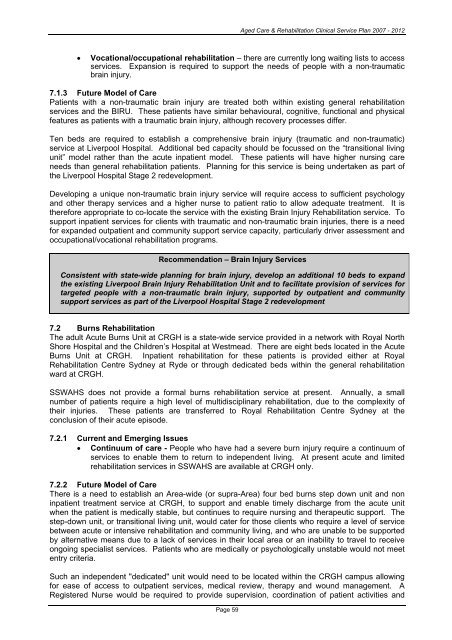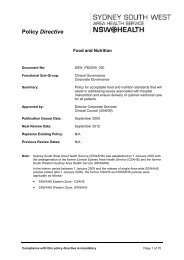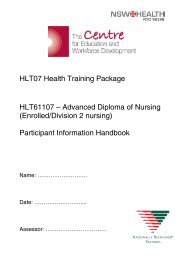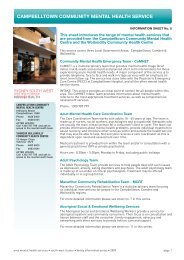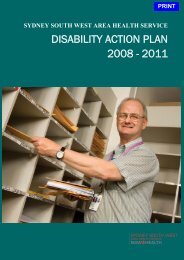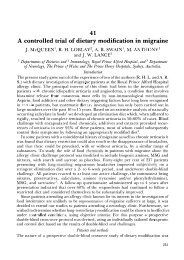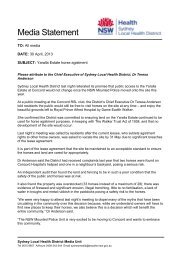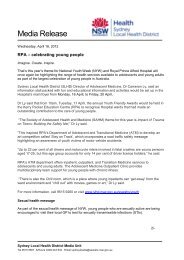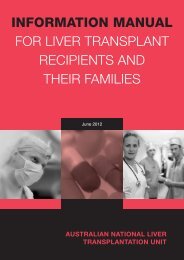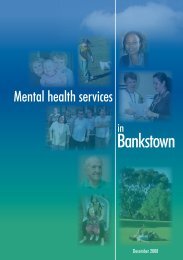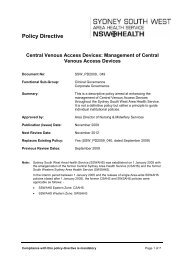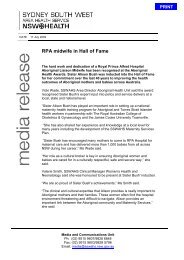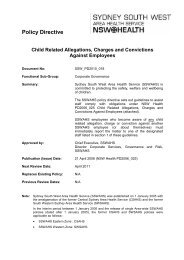Aged Care & Rehabilitation Clinical Services Plan 2007 – 2012
Aged Care & Rehabilitation Clinical Services Plan 2007 – 2012
Aged Care & Rehabilitation Clinical Services Plan 2007 – 2012
You also want an ePaper? Increase the reach of your titles
YUMPU automatically turns print PDFs into web optimized ePapers that Google loves.
<strong>Aged</strong> <strong>Care</strong> & <strong>Rehabilitation</strong> <strong>Clinical</strong> Service <strong>Plan</strong> <strong>2007</strong> - <strong>2012</strong>• Vocational/occupational rehabilitation – there are currently long waiting lists to accessservices. Expansion is required to support the needs of people with a non-traumaticbrain injury.7.1.3 Future Model of <strong>Care</strong>Patients with a non-traumatic brain injury are treated both within existing general rehabilitationservices and the BIRU. These patients have similar behavioural, cognitive, functional and physicalfeatures as patients with a traumatic brain injury, although recovery processes differ.Ten beds are required to establish a comprehensive brain injury (traumatic and non-traumatic)service at Liverpool Hospital. Additional bed capacity should be focussed on the “transitional livingunit” model rather than the acute inpatient model. These patients will have higher nursing careneeds than general rehabilitation patients. <strong>Plan</strong>ning for this service is being undertaken as part ofthe Liverpool Hospital Stage 2 redevelopment.Developing a unique non-traumatic brain injury service will require access to sufficient psychologyand other therapy services and a higher nurse to patient ratio to allow adequate treatment. It istherefore appropriate to co-locate the service with the existing Brain Injury <strong>Rehabilitation</strong> service. Tosupport inpatient services for clients with traumatic and non-traumatic brain injuries, there is a needfor expanded outpatient and community support service capacity, particularly driver assessment andoccupational/vocational rehabilitation programs.Recommendation – Brain Injury <strong>Services</strong>Consistent with state-wide planning for brain injury, develop an additional 10 beds to expandthe existing Liverpool Brain Injury <strong>Rehabilitation</strong> Unit and to facilitate provision of services fortargeted people with a non-traumatic brain injury, supported by outpatient and communitysupport services as part of the Liverpool Hospital Stage 2 redevelopment7.2 Burns <strong>Rehabilitation</strong>The adult Acute Burns Unit at CRGH is a state-wide service provided in a network with Royal NorthShore Hospital and the Children’s Hospital at Westmead. There are eight beds located in the AcuteBurns Unit at CRGH. Inpatient rehabilitation for these patients is provided either at Royal<strong>Rehabilitation</strong> Centre Sydney at Ryde or through dedicated beds within the general rehabilitationward at CRGH.SSWAHS does not provide a formal burns rehabilitation service at present. Annually, a smallnumber of patients require a high level of multidisciplinary rehabilitation, due to the complexity oftheir injuries. These patients are transferred to Royal <strong>Rehabilitation</strong> Centre Sydney at theconclusion of their acute episode.7.2.1 Current and Emerging Issues• Continuum of care - People who have had a severe burn injury require a continuum ofservices to enable them to return to independent living. At present acute and limitedrehabilitation services in SSWAHS are available at CRGH only.7.2.2 Future Model of <strong>Care</strong>There is a need to establish an Area-wide (or supra-Area) four bed burns step down unit and noninpatient treatment service at CRGH, to support and enable timely discharge from the acute unitwhen the patient is medically stable, but continues to require nursing and therapeutic support. Thestep-down unit, or transitional living unit, would cater for those clients who require a level of servicebetween acute or intensive rehabilitation and community living, and who are unable to be supportedby alternative means due to a lack of services in their local area or an inability to travel to receiveongoing specialist services. Patients who are medically or psychologically unstable would not meetentry criteria.Such an independent "dedicated" unit would need to be located within the CRGH campus allowingfor ease of access to outpatient services, medical review, therapy and wound management. ARegistered Nurse would be required to provide supervision, coordination of patient activities andPage 59


